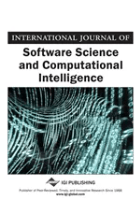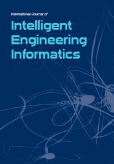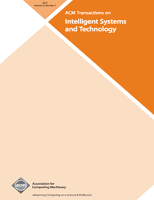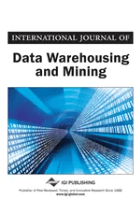
MACHINE LEARNING
Scope & Guideline
Unveiling the Power of Data-Driven Intelligence
Introduction
Aims and Scopes
- Algorithm Development and Optimization:
Research dedicated to creating and enhancing algorithms for machine learning tasks, including efficiency improvements, optimization techniques, and novel algorithmic strategies. - Statistical and Probabilistic Methods:
Studies that explore statistical models and probabilistic reasoning in machine learning, emphasizing inference, decision-making under uncertainty, and the integration of statistical learning principles. - Applications Across Domains:
Application-driven research showcasing how machine learning techniques can be applied in various fields such as healthcare, finance, sports analytics, and natural language processing. - Interpretable and Explainable AI:
Research focused on making machine learning models interpretable and explainable, addressing the need for transparency and understanding in AI systems. - Reinforcement Learning:
Studies within the reinforcement learning paradigm, including applications in robotics, gaming, and real-world decision-making scenarios. - Data Handling and Preprocessing Techniques:
Research that delves into methodologies for handling imbalanced datasets, feature selection, data augmentation, and preprocessing strategies essential for effective machine learning.
Trending and Emerging
- Federated Learning and Privacy-Preserving Techniques:
An increasing emphasis on federated learning frameworks that allow for decentralized model training while preserving user privacy, reflecting growing concerns regarding data security. - Explainable AI (XAI):
A significant trend toward developing methods that enhance the interpretability and transparency of machine learning models, addressing the demand for accountability in AI systems. - Integration of Multi-Modal Data:
Research focusing on the integration of diverse data types and sources (e.g., textual, visual, and sensory data) for comprehensive model training and improved performance. - Meta-Learning and Transfer Learning:
An emerging focus on techniques that facilitate learning from fewer examples and transferring knowledge across tasks, which is particularly relevant in environments with limited data. - Robustness and Adversarial Learning:
A growing interest in developing models that are resilient to adversarial attacks and capable of maintaining performance in the presence of noise and perturbations. - Neural Architecture Search and Automated Machine Learning (AutoML):
An increasing trend toward automated methods for model selection and hyperparameter tuning, streamlining the process of machine learning model development.
Declining or Waning
- Traditional Supervised Learning:
While traditional supervised learning remains significant, its prominence appears to be waning in favor of more complex learning paradigms such as deep learning and reinforcement learning. - Rule-Based Learning Methods:
The focus on classical rule-based learning approaches is decreasing as newer, more flexible methods like deep learning and ensemble methods gain traction. - Static Models without Adaptation:
Research involving static models that do not adapt to changing data distributions is becoming less common, as the need for models that can handle dynamic and evolving datasets grows.
Similar Journals

JOURNAL OF MACHINE LEARNING RESEARCH
Cutting-edge Research for Tomorrow's Intelligent SystemsJOURNAL OF MACHINE LEARNING RESEARCH, published by MICROTOME PUBL, stands as a premier journal in the realms of Artificial Intelligence, Control and Systems Engineering, Software, and Statistics and Probability. With an impressive Q1 ranking across multiple categories and a prominent Scopus ranking that places it among the top journals in its field—ranked 1st in Mathematics and 20th in both Artificial Intelligence and Software—this journal serves as a vital resource for cutting-edge research and advancements in machine learning. Established in 2001, it has been committed to disseminating high-quality research findings and innovative methodologies, addressing the evolving challenges and opportunities in machine learning. Furthermore, the journal maintains a rigorous peer-review process, ensuring that only the most significant contributions are published. With open access options available and a strong user-friendly platform, it invites researchers, professionals, and students to engage deeply with the pioneering work in the field.

Machine Learning and Knowledge Extraction
Driving Innovation in Artificial Intelligence and EngineeringMachine Learning and Knowledge Extraction, published by MDPI, is an esteemed Open Access journal that has been at the forefront of disseminating cutting-edge research since its inception in 2019. Based in Switzerland, this journal has established itself as a significant contributor to the fields of Artificial Intelligence and Engineering, currently ranking in the Q2 category in Artificial Intelligence and Q1 in Engineering (miscellaneous) for 2023. With a notable Scopus ranking, it holds the 35th position out of 204 in Engineering, placing it in the 83rd percentile, while it ranks 127th out of 350 in Computer Science, reaching the 63rd percentile. Machine Learning and Knowledge Extraction serves as a vital platform for researchers, professionals, and students alike, promoting insightful discussions, innovative methodologies, and profound discoveries in machine learning and data extraction techniques. The journal's open access model ensures that groundbreaking research is widely accessible, fostering collaboration and advancing knowledge across various disciplines.

International Journal of Software Science and Computational Intelligence-IJSSCI
Advancing the Frontiers of Software Science and IntelligenceInternational Journal of Software Science and Computational Intelligence (IJSSCI) is a prominent academic journal published by IGI Global, dedicated to advancing the fields of software science and computational intelligence. With its ISSN 1942-9045 and E-ISSN 1942-9037, IJSSCI offers a platform for researchers, practitioners, and students to disseminate innovative research findings, theoretical advancements, and practical applications in areas such as algorithm development, machine learning, and software engineering. Although the journal currently does not operate under an open access model, its rigorous peer-review process ensures high-quality publications that contribute significantly to the academic discourse. Based in Hershey, PA, IJSSCI is recognized for its commitment to fostering collaboration among professionals in the technology and computer science fields, making it an essential resource for those looking to stay at the forefront of software science advancements.

International Journal of Intelligent Engineering Informatics
Connecting Minds in Intelligent Engineering and AI.International Journal of Intelligent Engineering Informatics, published by INDERSCIENCE ENTERPRISES LTD, stands at the forefront of research in the interdisciplinary domains of computer science, artificial intelligence, and human-computer interaction. With an ISSN of 1758-8715 and E-ISSN of 1758-8723, this journal serves as a vital resource for researchers and professionals seeking to explore the latest advancements in intelligent engineering and informatics techniques crucial for the evolution of modern technologies. Although currently not an open-access publication, it provides a necessary platform for disseminating high-quality research; its impact factor continues to grow, attracting a diverse readership interested in signal processing, software development, and computer vision. Covering innovative topics from 2022 to 2024, the journal is committed to fostering scholarly dialogue that paves the way for emerging trends and applications in the field, ensuring its relevance and significance in today's rapidly advancing technological landscape.

IEEE Computational Intelligence Magazine
Pioneering Research for a Smarter TomorrowIEEE Computational Intelligence Magazine, published by the esteemed IEEE-INST ELECTRICAL ELECTRONICS ENGINEERS INC, is an essential resource for researchers and professionals in the fields of Artificial Intelligence and Theoretical Computer Science. With a robust Q1 ranking in both categories for 2023, this magazine stands out as a leader in disseminating cutting-edge research and innovative applications within computational intelligence. As an invaluable conduit for knowledge, it covers a diverse range of topics, including but not limited to machine learning, neural networks, and data mining. The magazine is particularly recognized for its interdisciplinary approach, bridging gaps between theory and application while contributing to advancements in technology and society. Although it does not offer open access, the insights provided are critical for staying at the forefront of this rapidly evolving discipline. Join a community of like-minded scholars and practitioners by exploring the latest findings and trends published from 2006 to 2024, operating from its headquarters at 445 Hoes Lane, Piscataway, NJ, United States.

ACM Transactions on Intelligent Systems and Technology
Shaping the Future of Intelligent Technology Through ResearchACM Transactions on Intelligent Systems and Technology, published by the Association for Computing Machinery (ACM), is a leading peer-reviewed journal dedicated to the rapid dissemination of innovative research in the fields of Artificial Intelligence and Theoretical Computer Science. With an impressive Impact Factor and a strong H-Index, it boasts a premier standing in the academic community, being ranked Q1 in both AI and Theoretical Computer Science categories as of 2023. This journal serves as a critical platform for researchers, professionals, and students aiming to contribute to and stay informed about the latest developments in intelligent systems and technology. While there are currently no open-access options, readers can explore invaluable insights into current trends and methodologies from 2010 to 2024, making it an essential resource for anyone passionate about advancing their knowledge in these rapidly evolving domains. The journal continues to foster collaboration and innovation, reflecting the forefront of research where technology intersects with intelligent systems.

Software Impacts
Empowering Research to Transform Software PracticesSoftware Impacts is an esteemed academic journal published by ELSEVIER, dedicated to advancing the field of software science and informing best practices in development and application. With an ISSN of 2665-9638, this journal facilitates the dissemination of impactful research from 2019 to 2024, making it a valuable resource for both established researchers and promising students alike. Although it currently holds a Q3 ranking in the category of Software and ranks at #270/407 in Scopus, it continues to contribute significantly to the discourse surrounding software-related innovations and methodologies. The journal’s open access policy enhances accessibility and encourages a broader readership, fostering an environment where critical discussions flourish. By addressing the ongoing challenges and advancements in software technology, Software Impacts plays a crucial role in shaping the future of software development and its applications globally.

ANNALS OF MATHEMATICS AND ARTIFICIAL INTELLIGENCE
Illuminating the Path Between Algorithms and EquationsThe ANNALS OF MATHEMATICS AND ARTIFICIAL INTELLIGENCE, published by Springer, is a prominent journal dedicated to exploring the intersection between mathematics and artificial intelligence. With an ISSN of 1012-2443 and an E-ISSN of 1573-7470, this esteemed publication has been at the forefront of groundbreaking research since its inception in 1990, converging its focus to address emerging trends through 2024. Currently categorized in the Q3 quartile for both Applied Mathematics and Artificial Intelligence as of 2023, it holds respectable ranks within Scopus, positioning itself as a vital resource for scholars with a rank of #228 in Applied Mathematics and #217 in the realm of Artificial Intelligence. Notable for its commitment to advancing theoretical and applied methodologies, this journal serves as an indispensable platform for researchers, professionals, and students keen to deepen their understanding and innovate within these domains. Although it does not operate under an open-access model, the journal emphasizes rigorous peer-reviewed scholarship, ensuring that each published article contributes significantly to the global dialogue on number theory, machine learning, and their multifaceted applications.

AI, published by MDPI, is a distinguished open access journal dedicated to advancing the field of artificial intelligence. Since its inception in 2020, the journal has swiftly established itself as a prominent platform for scholarly research, currently ranking in the Q2 category for 2023 within the artificial intelligence sector according to Scopus. With an impressive global reach from its base in Basel, Switzerland, the journal aims to foster innovation and collaboration among researchers, professionals, and students alike, providing a forum to share groundbreaking findings and applications in AI. The journal's commitment to accessibility ensures that research is available to a wide audience, enhancing knowledge dissemination and contributing significantly to the ongoing evolution of artificial intelligence technologies. To explore the latest in AI research, readers can access articles through their open access model, encouraging an inclusive academic environment.

International Journal of Data Warehousing and Mining
Exploring New Frontiers in Data ManagementInternational Journal of Data Warehousing and Mining, published by IGI Global, is a vital resource in the field of data management and analytics, catering to researchers, professionals, and students alike. With ISSN 1548-3924 and E-ISSN 1548-3932, this journal has been at the forefront of disseminating pioneering research since its inception in 2005 and will continue to do so through 2024. Despite its current categorization in the Q4 quartile for Hardware and Architecture as well as Software, and its Scopus rankings, the journal aims to foster innovation within the domains of data warehousing, data mining, and their applications across various sectors. The absence of an open access option does not diminish its significance; rather, it ensures that the journal maintains rigorous peer-review standards, providing high-quality research outputs that contribute to ongoing discussions and advancements within the field. Researchers and practitioners looking to stay updated on the latest trends and methodologies will find the International Journal of Data Warehousing and Mining an indispensable tool in their academic and professional endeavors.